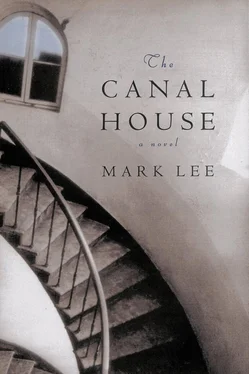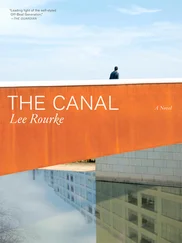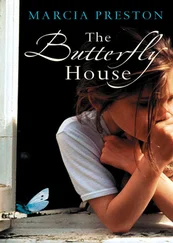The Canal House

Mark Lee

F O R M Y M O T H E R
With thanks to: Wendy Belcher, Robert Cook, Jenny Darling, Liam Kelly, Therese Kosterman, Pat Lau, Joan Marble, Don Miller, Kathy Pories, and especially Joe Regal.
Nicky

I once read thediary of an Englishman who was trapped at the South Pole in 1914. After their ship was frozen into the ice, he and his companions survived for two years on seal blubber and boiled penguins. On several occasions they almost starved to death. The men became obsessed with food and considered themselves experts on its preparation and consumption. Huddled in their canvas tents, they spent hours describing favorite meals and imaginary banquets. They debated the right way to cook trout, and two men had a fistfight over the proper use of clotted cream.
I offer these facts as an oblique defense for my own obsession. Like those lost explorers, I’m a starving man. For most of my life I’ve never been in love, but I think about it often and consider myself an expert on its various complexities. I watch for lovers on the street and in restaurants. I’ve become a collector of jealous glances and lingering kisses, capturing the moments of others and storing them in my memory.
I was watching one afternoon at a dusty refugee camp in northern Uganda when Daniel McFarland and Julia Cadell first spoke to each other. I saw nothing in that encounter, but they met in England a few months later and fell in love. This time the collector was collected. Even now I’m trying to understand the faith and desire, the large ambitions and small compromises, that brought the three of us to our final moment together.
A FEW YEARS AGO, a powerful earthquake hit southern Turkey. I was a photographer on contract to Newsweek , so the magazine flew me to Istanbul and I hired a taxi driver to take me south to the city of Adana. When we finally got there, I discovered that only a few hundred people were dead. The earthquake was a disaster for the people who lived there, but as far as Newsweek was concerned it wasn’t a major story.
Normally I would have taken a few hundred shots and returned to London, but this time I was forced to stay. My photo editor, Carter Howard, said that a canine search-and-rescue team from Missouri was being flown to Adana by the U.S. Air Force. He wanted pictures of a golden retriever named Cliff finding people lost in the wreckage.
While waiting for the dog, I wandered around the collapsed buildings and took photographs. I prefer 35mm film to digital, but there was no easy way to develop negatives or send them out. The digital camera made it easy. I’d shoot a disc, download everything onto my laptop, then hook up to my satellite phone and send the images to London.
I was sleeping at the home of an Armenian tea trader. Every morning I would roll up my sleeping bag, eat a few candy bars, and go look for rescue crews. Almost everyone in Adana was wearing surgical masks to filter out the dust and germs. Street vendors sold perfume to block the smell of uncollected garbage and I sprinkled a French product called Illusion on my mask. Sniffing the scent of roses, I wandered past piles of shattered concrete and twisted rebar, the collapsed remains of factories, apartment buildings, and mosques. The streets of Adana were clogged with bulldozers and trucks. Bodies were stuffed into plastic bags and laid out in rows in the middle of the soccer stadium. By noon my clothes and skin were covered with white dust and there was a salty, foul taste in my mouth.
Cynicism is an occupational necessity in my profession; it’s like the chloroquine you swallow in a malaria zone. You can still get the disease, of course, but the bitter little pills hide your symptoms. The trick is to take your photographs and get out before the medicine loses its effectiveness.
Unfortunately, I stayed too long in Adana and the cynicism wasn’t working. The destruction of the city and the grief of its survivors clung to me like the dust from the shattered buildings. The grief became a physical sensation, a hollowness in my stomach and a weakness in my bones. I woke up wondering why this disaster had happened and what purpose it served in some divine scheme. My weakness, my confusion, stayed with me as I wandered around and met the earthquake victims. Most of them carried objects saved from the wreckage: a photo album, a vacuum cleaner, two green parakeets in a little brass cage. The sky above us was clear and blue, but the air was dusty and it distorted the light.
I began to worry about Cliff, the golden retriever. Covering the floods in southern China I learned that rescue dogs got depressed when they found nothing but dead bodies. Their handlers would have to bury a few living people under a pile of leaves and branches so that the dogs would feel encouraged enough to keep working. That’s what I needed—a fake rescue to help my morale—but it wasn’t going to happen.
The soldiers stopped finding survivors after the third day, but they kept on searching. Late in the afternoon on the fifth day I found a rescue crew pulling away chunks of concrete at a partially destroyed medical clinic near the river. A soldier screamed at me in Turkish, then English: “Go back! Go back! Many dangerous here!” And I could see that part of the second floor was about to collapse.
I turned away from the wreckage, and N. Barbieri, the Italian photographer who works for Reuters, slipped past me and scrabbled over the chunks of concrete. Nina started out using only her first initial so that the Italian newspaper editors would think she was a man. Other photographers called her the Rat, because she was small, fearless, and had close-cropped black hair. Since there aren’t a lot of photographers covering international news, we all know each other. We drink together and travel together, but that doesn’t mean we’re friends.
The Rat stopped for a moment, then glanced back and asked, “You going in there, Nicky?”
“Forget it.” The danger of the situation didn’t bother me; I had simply had enough of Adana. I took a quick shot of the building’s shattered facade, then trudged back home to my bag of chocolate bars.
Five minutes after I left, N. Barbieri took a great photograph, a finalist for Picture of the Year. The Rat was standing on the edge of the second floor, shooting downward, when they discovered a dead mother, embraced by her unconscious but still living, four-year-old son. Both are covered with a white dust. The Turkish soldiers stand back, amazed, like the shepherds who have just found the babe in the manger.
I had made a mistake, but I didn’t know it yet. A day later I gave up on the dog and bribed my way onto an army truck going north to Istanbul. I checked into the Sheraton and spent two days taking baths and ordering room service. By the time I returned to London, the latest edition of Newsweek was being sold at Heathrow. The earthquake mother and child were on the cover and the photo credit was N. BARBIERI/REUTERS.
Standing in front of the airport magazine rack, I felt tired and ashamed. I hadn’t missed the shot because of equipment problems or bad luck. That afternoon in Adana I had lost my photographer’s faith: the certainty that if you go forward, always go forward, the picture will come to you.
Читать дальше














